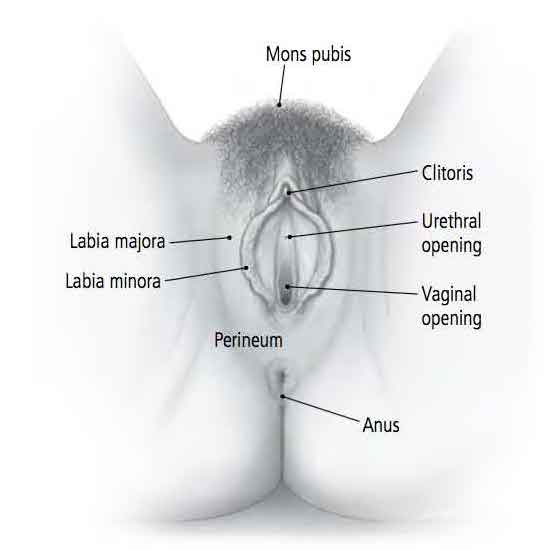
As an obstetrician/gynecologist, I spend my days examining women’s reproductive organs. My patients come to my office with a variety of concerns, some of which can be grouped under the heading of vulvar health.
However, many women do not feel comfortable discussing precisely what is bothering them. And rather than use the anatomically correct word — vulva — my patients often tell me, “I have a problem down there.” My job is to figure out what they mean, explain helpful points about vulvar and vaginal health, and empower them to understand their bodies.
A look at the anatomy
To begin, let’s clarify and name the organs that comprise “down there.” The vulva refers to the labia majora, labia minora, and the clitoris. The vaginal introitus is the opening of the vagina. The vagina connects to the cervix, which sits at the top of the vagina and leads into the uterus. The cervix is the passage for menstrual blood flow. During childbirth, it dilates to allow babies to pass from the uterus through the vagina and into the world.

Six common-sense tips for vulvovaginal health
Many women have never been taught how to treat their vulva and vagina with care in order to maintain vulvovaginal health. Some of the most common issues I treat, such as vulvar itching or folliculitis (red bumps that are inflamed hair follicles), can be avoided with good care and some common-sense rules.
- If you’re sexually active, get screened regularly for sexually transmitted infections (STIs), such as chlamydia, gonorrhea, and trichomoniasis. Practicing safer sex, by using barrier methods like condoms or dental dams with every sexual encounter, can help decrease your risk for STIs. Although antibiotics help treat many STIs, some last for a lifetime, such as herpes, HIV, and HPV. If you use diaphragms, cervical caps, vibrators, or sex toys, wash these before and after use with warm soapy water.
- Wear cotton underwear. I tell my patients that the skin on the vulva needs a chance to “breathe.” When getting ready for bed, remove your underwear and wear loose cotton pajamas or shorts, or no bottoms at all. Even if you change into fresh underwear prior to bed, the fabric is constraining and prevents the vulvar skin from breathing.
- If you have sensitive skin or have had eczema (which can affect vulvar skin), avoid washing your underwear in bleach or fabric softeners. These products can irritate the skin. For women with particularly sensitive skin, I recommend avoiding scented laundry detergents and using a hypoallergenic detergent.
- When showering, avoid scalding hot water and scented soaps, particularly if you have sensitive skin. Do not use any harsh products to wash the vulvar skin, such as sponges or loofahs. Never use talcum powder, which some research links with ovarian cancer.
- After a workout, shower and change quickly. Staying in sweaty underwear and tight workout clothing could encourage the growth of a yeast infection or irritate your skin.
- If you use tampons or pads, choose unscented cotton products without a mesh covering. Change them often (about every two to six hours). Do not wear pantiliners daily, as even unscented cotton pantiliners can cause irritation if used daily.
Does the vagina need cleansing?
The vagina has its own cleansing mechanisms. Usually, the vagina maintains its own health nicely (unless you develop an infection, which needs to be treated by your gynecologist or health care team).
Here’s how it works: The cells that line the vagina are shed periodically so new cells can grow. Glucose (a kind of sugar) in the shedding cells feeds normal bacteria in the vagina called lactobacilli. The lactobacilli convert glucose into lactic acid, forming an acidic environment that naturally maintains vaginal health. Anything that disrupts the natural balance of the vagina, such as douching, can lead to an infection.
It’s best to avoid all products marketed to cleanse the vagina. The vagina does not need cleansing or perfume. Remember, vaginal cells will shed naturally on their own. Also avoid scented feminine products. These may disrupt the delicate bacterial balance in the vagina or cause vaginal or vulvar irritation.
If you think that you have any issues with vulvovaginal health, it’s best not to self-diagnose and treat yourself. Call your gynecologist or health care team, and have them evaluate your symptoms.
